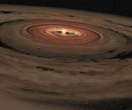This is Scientific American 60 Secomds, Space. I'm Clara Moskowitz, got a minute?
这里是科学美国人60秒,太空系列。我是克拉拉·莫斯科维兹。
Call this story, "A star is stillborn."
这是一个“胎死腹中”的恒星的故事。
The object is a brown dwarf, which started off the same way that more conventional stars form, but which lacked the mass required for nuclear fusion to ignite and radiate starlight. What resulted was a body somewhere in between a star and a planet.
今天我们要讲述的是褐矮星,它和其他恒星的形成过程没什么两样,但因质量不够大,不足以在核心点燃聚变反应的气态天体形成燃烧的恒星。褐矮星是质量介于最小恒星与最大行星之间的天体。

It was spotted recently by NASA's WISE and Spitzer space telescopes. And it's been dubbed WISE J085510.83-071442.5. So let's not say its name again, okay?
美国航空航天局的科学家借助WISA和Spitzer太空望远镜观测到了褐矮星。这一褐矮星已经被正式编号为WISE J104915.57-531906。太拗口了,我们别再提他的名字了,好吧。
At only about three to 10 times the mass of Jupiter, this WISE guy is small even for a brown dwarf. It's the fourth-nearest star system, just 7.2 light-years away. And it's freezing—about as cold as the North Pole.
这颗仅比木星大两倍到九倍的恒星和普通的褐矮星相比算是个“小不点”。是距离地球第四近的恒星系统,只有7.2光年的距离。恒星表面冷气逼人,温度堪与北极相比。
Temperatures on this body range from a frosty minus 54 to plus 9 degrees Fahrenheit. For comparison, the sun's surface is a toasty 10,000 Fahrenheit.
这颗恒星上的温度最低可低至零下54华摄氏度,最高也只有零上9华摄氏度。我们再来看看太阳比较一下,太阳表面的温度高达1万华摄氏度!
Noticing such a cold object in space that radiates almost no light would be impossible with visible-light telescopes. Its dim thermal glow was just barely discernible to the infrared eyes of WISE and Spitzer. And its name ensures mostly continued anonymity.
用可见光望远镜想要观测到这种几乎不会释放光的冰冷恒星是不太可能的。WISE和Spizer的红外线镜也只能依稀辨别褐矮星微弱的光芒。很少有人能记住这颗褐矮星拗口的名字,这也就确保了它的神秘性。
Thanks for the minute for Scientific American 60 Secomds, Tech. I'm Clara Moskowitz.
感谢收听。


